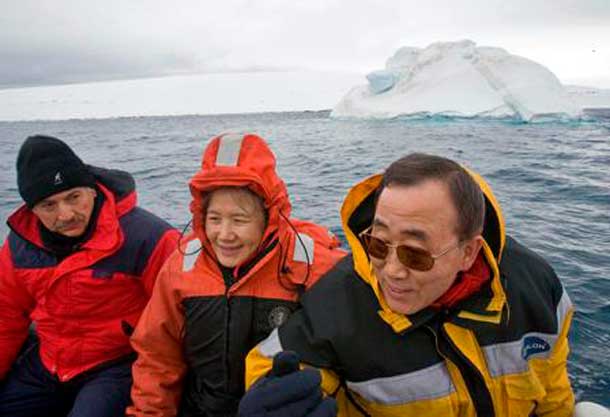

 UNITED NATIONS – As Secretary-General, it’s my job to strive for a secure and peaceful world. This means addressing threats — not only to those of us who inhabit the planet today but to future generations.
UNITED NATIONS – As Secretary-General, it’s my job to strive for a secure and peaceful world. This means addressing threats — not only to those of us who inhabit the planet today but to future generations.
There is perhaps no greater threat to the global community than that of climate change. It represents a clear danger to us all here and now, and in years to come.
Climate change is the single greatest threat to development, and can undermine the progress already achieved in reducing poverty. It is a risk to economies large and small, and to the stability of the global financial system. It raises risks of diminished supplies in much of the world, and it can threaten peace.
Without taking urgent measures, the world is on a trajectory towards warming well above two degrees centigrade Celsius (3.6 degrees Fahrenheit) above pre-industrial temperatures by the end of this century – the point where the most dangerous impacts of climate change are expected to take hold.
Last month, the Intergovernmental Panel on Climate Change reported that climate change is affecting the global water cycle, which leads to irregular rainfall, more floods and more droughts. The report clearly demonstrated that human influence on the climate system is now evident in most regions of the globe. It is extremely likely that human influence has been the dominant cause of the observed warming since the mid-20th century.
This is deeply disturbing. Yet too often, one important fact gets lost amid the fear: addressing climate change is also one of our greatest opportunities.
We can create decent jobs, improve public health, empower women, and protect the environment with enlightened action on climate change. We don’t need to wait for the breakthroughs of tomorrow. The technologies, policies and practices in our hands now can help speed and scale up climate mitigation and adaptation today.
The private sector has a vital role to play. Businesses can lead by example within industries and networks. Industry leaders can actively align their business needs while creating a sustainable future.

Addressing climate change is the right thing to do, and I firmly believe that the results will also be plain to see on the bottom line. Businesses can benefit by reducing greenhouse gas emissions and by using energy cleanly and efficiently. Building resilient infrastructure and providing climate-smart services is forward-thinking business.
Energy is a prime example. Around the globe, nearly one person in five still has no access to electricity. More than twice that number — 2.8 billion, or 40 per cent of the world’s population — rely on wood, charcoal, animal and crop waste or other solid fuels for cooking and heating. The negative impact on the environment is tremendous, as well as people’s health and time.
Those of us who have access to modern energy often waste it – knowingly or unknowingly. We must use energy more efficiently and focus on cleaner, low-carbon solutions and save resources and money in the process.
We are seeing progress. Clean energy investment has quadrupled over the last decade and last year saw a dramatic shift in the balance of renewable energy investment.
The dramatic growth of renewable energy markets over the past decade has also brought technology improvements and cost reductions that mean projects can generate attractive returns. Investors are opening new markets, facilitating new business models and supporting entrepreneurs in the developing world where demand for sustainable energy for all is greatest.
Opportunities abound. To seize them, we need to scale up our efforts. The longer we delay, the greater the costs — to communities, to businesses, to economies and to the planet. The sooner we act, the more we all will benefit.
To add momentum, I have invited world leaders and leaders from business and civil society to a Climate Summit in September next year to mobilize political will for a legal agreement on climate change in 2015, deliver concrete new commitments and spark a race to the top in climate action.
I am calling on everyone to be a leader on climate change. Take decisive action while we still can. It’s good for the planet — and good for business.
Ban Ki-moon
Secretary-General of the United Nations at United Nations













